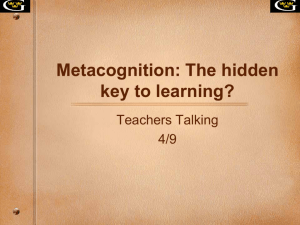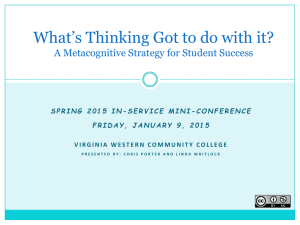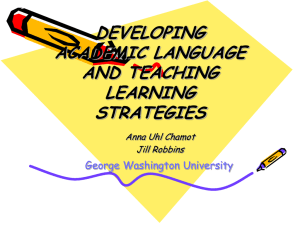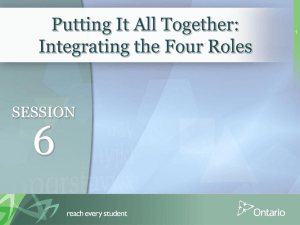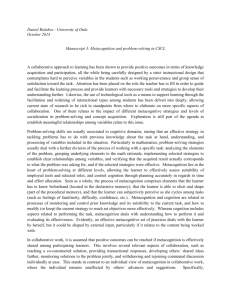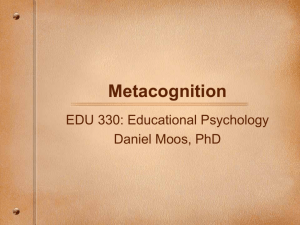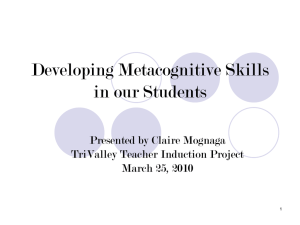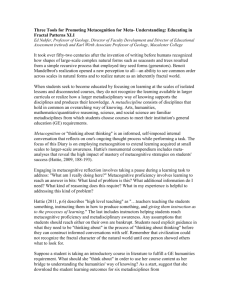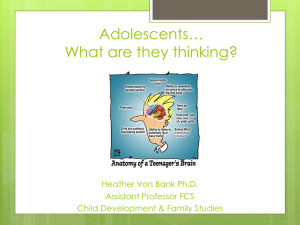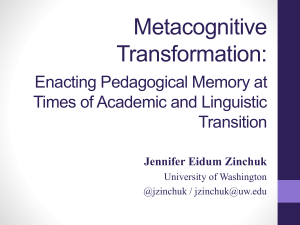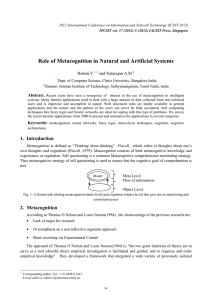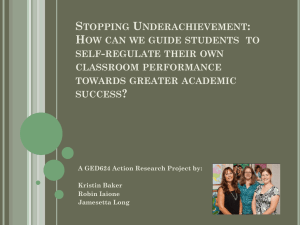Activity 11 - Matthew Tsui
advertisement
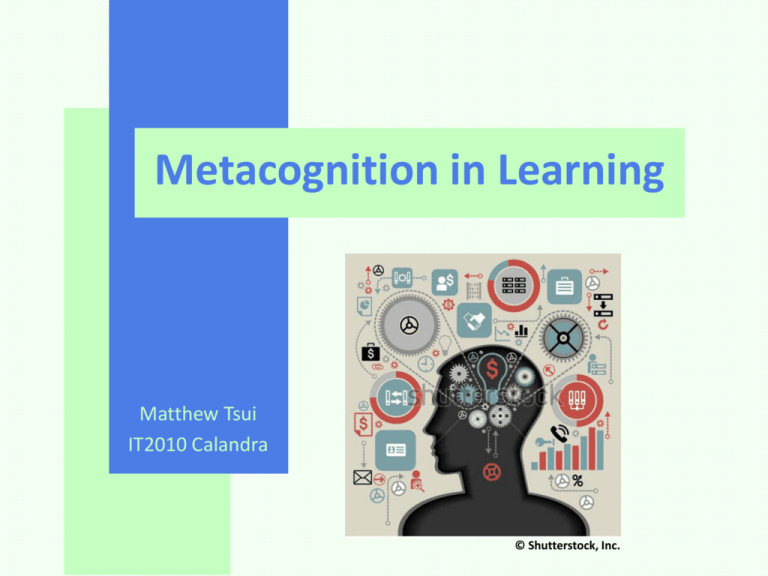
Metacognition in Learning Matthew Tsui IT2010 Calandra © Shutterstock, Inc. What is Metacognition? • Defined as “cognition about cognition” • Or more simply “thinking about thinking” John H. Flavell © Stanford University • Term first used by John H. Flavell, a developmental psychologist and professor from Stanford University Cognition vs. Metacognition Cognition: Processes involved in learning such as thinking, understanding, remembering, etc… Example: Memorizing a list of vocabulary words Metacognition: Process of becoming aware of one’s own learning processes and taking steps to make changes Example: Implementing memorization strategies to aid memorization such as mnemonic devices Metacognitive Knowledge and Metacognitive Regulation Metacognitive knowledge is the awareness of cognitive processes Metacognitive regulation is the implementation of metacognitive knowledge From our previous example: - Understanding your skills in memorizing words and recognizing that you may need help is metacognitive knowledge - Implementing the strategy of mnemonic devices is metacognitive regulation (Veenman, Van Hout-Wolters, & Afflerbach, 2006) 3 Types of Metacognitive Knowledge Person Variables - Knowledge on how human beings learn - Knowledge on one’s individual learning processes Task Variables - Knowledge of the nature of a particular task - Knowledge of the type of processing required to complete the task Strategy Variables - Knowledge of cognitive and metacognitive strategies - Knowledge of when and where to use the strategies (Livingston, 2003) Review Person Variables Cognition Metacognitive Knowledge Task Variables Strategy Variables Metacognition Metacognitive Regulation Conclusion • You have most likely engaged in metacognition whether you are aware or not © Clip Art • Becoming more aware of it can only help in developing and training your learning processes • Studies have shown metacognition and academic performance are related (Arslan & Akin, 2014 & Efklides, 2014) • Remember: It is not enough to be aware of your strengths and weaknesses, but you must also make changes and take steps to improve. References Arslan, S. & Akin, A. (2014). Metacognition: As a Predictor of One's Academic Locus of Control. Educational Sciences: Theory & Practice, 14(1), 33-39. Retrieved from http://ezproxy.gsu.edu/login?url=http://search.ebscohost.com/login.aspx?direct=true&db= a9h&AN=95031776&site=ehost-live. Efklides, A. (2014). How Does Metacognition Contribute to the Regulation of Learning? An Integrative Approach. Psychological Topics, 23 (1), 1-30. Retrieved from http://ezproxy.gsu.edu/login?url=http://search.ebscohost.com/login.aspx?direct=true&db= a9h&AN=95881862&site=ehost-live Livingston, J. A. (2003). Metacognition: An Overview. Retrieved from http://eric.ed.gov/?id=ED474273 Schunk, D. H. (2008). Metacognition, self-regulation, and self-regulated learning: Research recommendations. Educational Psychology Review, 20(4), 463-467. Retrieved from http://libres.uncg.edu/ir/uncg/f/d_schunk_metacognition_2008.pdf Veenman, M., Van Hout-Wolters, B., & Afflerbach, P. (2006). Metacognition and learning: conceptual and methodological considerations. Metacognition and Learning, 1(1), 3-14. Retrieved from http://link.springer.com/article/10.1007%2Fs11409-006-6893-0
